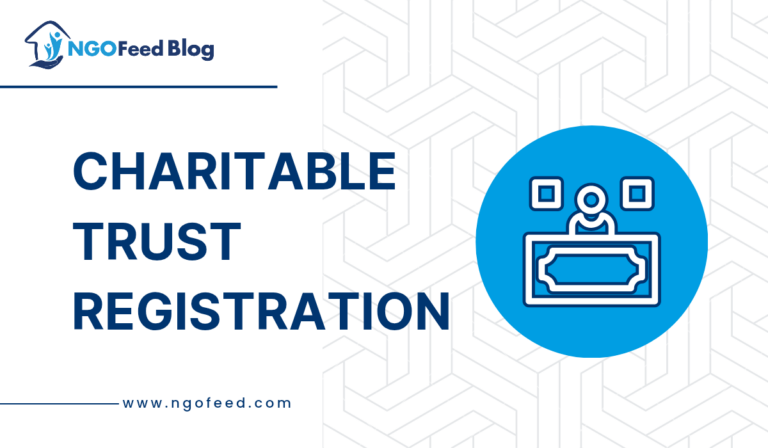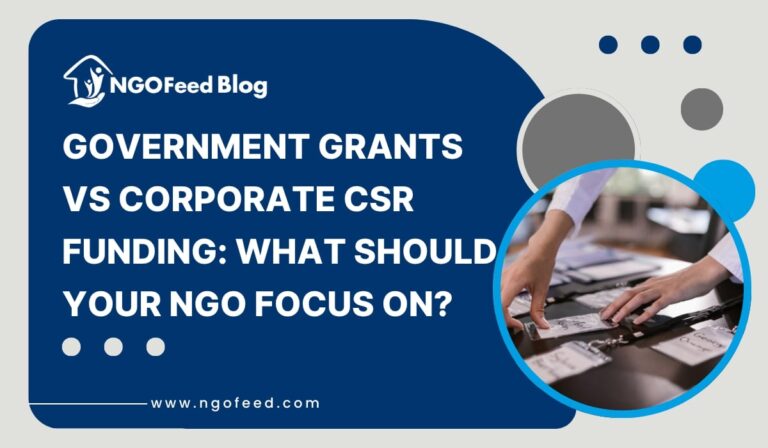GST Registration for NGOs: Non-Governmental Organisations (NGOs) are active actors in helping and managing social, environmental and humanitarian problems, and they may engage in a donation-driven, grant-driven and contribution-driven funding approach. Although NGOs are commonly related to non-profit and charitable activities, they are involved in financial transactions which come within the scope of the taxation acts in India. A good example of this could be the Goods and Services Tax (GST), which is a detailed indirect tax regime that regulates the supply of goods and services in the nation.
To NGOs, it is imperative to comprehend and control the GST regulations in order to achieve transparency, credibility, and ease of financial affairs. Not every NGO will be mandated to register under GST; however, NGOs in India undertaking activities such as training provision, consultancy or commercial services, or those that surpass certain turnover levels should obtain GST registration. It not only ensures that they comply with legal demands but also builds confidence in the eyes of donors, government agents and corporate partners.
Also, there might be some benefits with your GST registration, like input tax credit can be claimed and the financial reputation increases. The applicability of GST to NGOs is, however, not simple, and it will be interpenetrated according to the nature of activities and sources of funds.
Also Read: NGO Registration for Religious or Spiritual Purposes
It is in this regard that the importance of NGOs gaining knowledge about the necessity, requirements and advantages of registering for GST will prevail. This will not only protect their operations against any legal challenge but also help them advance their status as well-managed organisations that are transparent in their operations.
Table of Contents
Understanding GST Registration for NGOs
In spite of the non-profit intentions of NGOs on a larger scale, the activities they conduct with money might just come within the Goods and Services Tax (GST) net. Applicability of GST to NGOs also greatly depends on the character of the services they offer and the annual turnover of such organisations.
NGOs, even when aggregated turnover limits are surpassed, are subject to registration under the GST law, and the threshold limit is presently 20 lakhs (10 lakhs in case of special category states). This turnover takes into account earnings derived from practices like consultancy services, training, selling of goods or any commercial service that is not consist solely of charity in its nature. As an example, when the NGOs generate some income by conducting a workshop, vocational training, or research, it could fall under the GST.
Also Read: NGO Registration Under Indian Trust Act: A Beginner’s Guide
It should be noted that charitable activities, which have been given specific exemption by the government to continue doing their work, like public health services, furthering the education of underprivileged sections of society or helping the poor, are not subject to GST. All other services not within the exemptions, however, may become subject to payment of GST.
The main conclusions:
- NGOs with a turnover of more than the registration limit will have to get GST registration.
- Profits on consultancy, training or commercial services have to be paid tax.
- The pure charitable activities after notification of GST will be exempt.
- GST does not apply to donations which are without quid pro quo or where no benefit is implied.
Therefore, NGOs have to assess their sources of revenue keenly to decide whether to undertake registration in terms of GST registration. Complying not only avoids any legal issues but also gives them financial transparency in their dealings.
What is GST and How Does it Apply to NGOs?
The Goods and Services Tax (GST) is a comprehensive indirect tax on the supply of goods and services across India. NGOs conducting charitable activities may fall under exemptions if their operations qualify as “charitable activities” under GST law. However, NGOs earning income through sale of goods or paid services may be required to register for GST.
Key Points:
- GST applies only if an NGO makes taxable supplies.
- Donations received for charitable purposes are generally exempt from GST
Registration threshold: NGOs must register if their annual turnover exceeds ₹20 lakh (₹10 lakh in special category states).
GST Registration for NGOs – Application Procedure
In cases where the NGOs regarding the set criterion are as per the GST law, registration is a compulsory measure to remain within the law and facilitate relevant financial processes. It has been streamlined and has been done online fully using the GST portal, and would therefore be quite simple in cases where the organisation has the necessary documents ready.
Also Read: How to Choose the Right Name for NGO
Normal steps of the procedure are as follows:
- Go to the GST portal (www.gst.gov.in) and log in with the details of PAN and mobile/email of the NGO.
- Complete Part A of GST REG-01 form and fill in simple information like name of the organisation, PAN and state in which it is registered.
- Be issued with a Temporary Reference Number (TRN) to continue with the application.
- Fulfil Part B of GST REG-01 that involves the submission of detailed information on the NGO, authorised signatories of the NGO, the information regarding the bank account, and the activities of the NGO.
- The uploading of the necessary papers, including PAN, address, registration certificate and identity of authorised representatives.
- GST authorities verification- once verified, a GSTIN (Goods and Services Tax Identification Number) is provided.
Main Things to Remember – GST Registration for NGOs:
- It is all done online, using less paperwork.
- As an NGO, an authorised signatory (a senior member or trustee) should be appointed to manage GST compliance.
- GST returns have to be filed periodically by NGOs once registered.
These steps will ensure that the non-governmental organisations will accomplish the GST registration easily and with a compliant financial structure, which will make them more credible in the eyes of donors, the government, and their corporate partners.
Documents Required – GST Registration for NGOs
To NGOs, the GST registration process may be daunting and intimidating; unlike GST registration, the procedure can easily get wound up and knowing how to undertake such steps effectively can help make the process much simpler. GST compliance is necessary to offer transparency and credibility, and therefore, NGOs should know the registration requirements.
Also Read: Trust Vs Society Vs Section 8
In a normal registration process, there will be:
- Transactions: NGOs should then move on to evaluate their eligibility for GST. Registration is compulsory in the case of their annual turnover being above the threshold set by taxable services.
- Preparation of documents: Necessary supporting documents, such as PAN of the NGO, Proof of Address, details of the bank, and power of attorney, must be prepared.
- Phone or Web-Based Application Filing: Registrations are made using the GST portal, where the information is filled out and documents are uploaded.
- Verification and GSTIN Allocation: When verified, an NGO is allocated a GST Identification Number (GSTIN), and this is to be used as the official reference when carrying out all transactions related to taxes.
NGO considerations:
- Registration comes with accountability as well as the obligations of compliance, such as filing returns.
- Though not required, voluntary registration can enable NGOs to input tax credit so that they can be more credible to donors.
- It may not be necessary to register exempt NGOs carrying out exempt activities (such as charitable services).
Through a systematic procedure, GST registration should be fairly simple, with NGOs not having to worry much about closing this loop as far as their financial operations are concerned.
Benefits of GST Registration for NGOs
Registrations under GST hold a number of benefits to the NGOs that extend beyond conformity. Although this will be like an extra administrative burden, it is actually an undertaking that contributes to better transparency, credibility and efficiency of operations.
Also Read: Common Mistakes to Avoid During NGO Registration
The main advantages of GST Registration for NGOs are:
- Increased Credibility: GST registration gives donors, funding agencies, and governments a greater desire to support the NGOs since the accountability of its finances is visible.
- Access to Grants and CSR Funds: Corporate and institutional donors require most of their grants and CSR Funds to be GST compliant before giving them funding.
- Input Tax Credit (ITC): NGOs are allowed to take a credit and take back GST on goods and services used as purchased (such as event management, printing or IT service) and lower their expenses of operation.
- Facilitation in Nationwide Activity: An NGO can perform its activities on a nationwide basis without tax hurdles in the various states when they have a GSTIN.
- Improved Transparency and Governance: It will provide better transparency and governance where all transactions are captured in a single taxation regime and helps in building trust.
In this sense, GST registration is not only beneficial in assisting NGOs in their compliance needs, but further offers NGOs with a greater financial position and expanded abilities in attaining finance and investment opportunities, as well as expanded capabilities in partnerships.
Also Read: NGO Darpan Registration
Frequently Asked Questions (FAQs)
1. Does all NGOs need to undertake GST Registration for NGOs?
No. GST registration should only be done when NGO exceeds either the goods turnover or services turnover threshold limit (Generally 20 lakhs in a state and 40 lakhs in case of goods). NGOs under this figure are not subject to tax.
2. Is GST payable on donations received by NGOs?
Donations imparted with the sole purpose of no anticipations of goods or services are exempted to GST. But where donations have been connected to provision of goods/services (such as event tickets or sponsorships), then GST could be charged.
3. Under GST will NGOs get Input Tax Credit of (ITC)?
Yes, GST registered NGOs are eligible to avail the ITC input on your purchases like event services, printing, or office supplies, in case of taxable uses.
4. What effects do GST have on NGOs CSR-funded projects?
CSR contributions made in form of grant or donations that are not subjected to services, are tax free. Nevertheless, GST can be applicable in case the NGO supplies services or deliver shafts at some cost of the CSR funds.
5. What are the major GST requirements compliance to NGOs?
NGOs will be required to submit periodic GST returns and proper invoices and pay their taxes in time. Failure to comply is punishable and can result in loss of ITC privileges.









